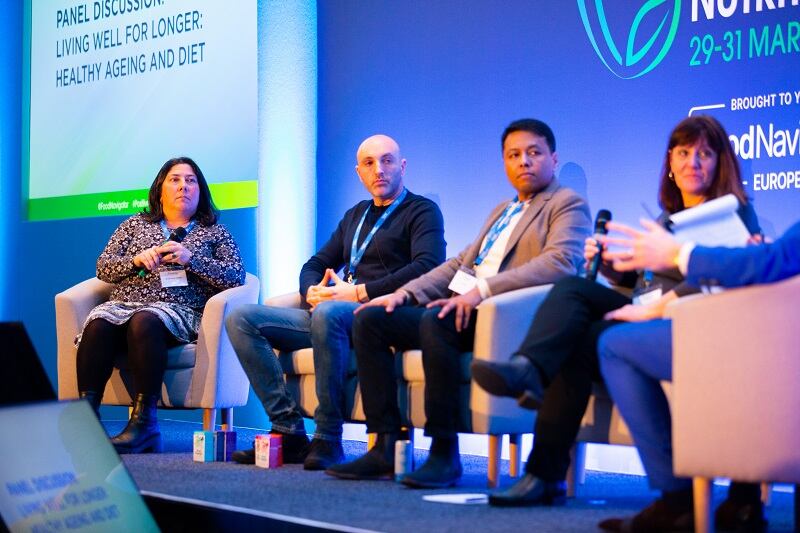Older consumers are a growing cohort. In Europe, the population of over 65s is expected to reach almost 150 million by 2050.
But new product launches specifically aimed at older consumers are few and far between. According to market researcher Mintel, just 0.0005% of new product launches in the food and beverage and health and hygiene space directly targeted the over 55s in 2021.
The reasons? Brands have traditionally shied away from targeting older consumers who are happy to buy products aimed at younger people, but not vice versa. We don’t like being told we are getting older. We want to carry on eating what we always have done.
But with demographics tilting so much towards older people, now may be the time we see more bands being brave enough to directly target older people with healthy ageing products.
Professor Louise Dye, from the University of Leeds, a Chartered Health Psychologist whose research focuses on the effects of nutrition on cognitive function and decline, health and wellbeing, said ingredients such as theanine, amino acids, polyphenols, omega 3s are being keenly explored for their effects on cognitive health as we age.
"Fibre intake is really important, not just for nutrients but also for brain health because it lowers glycaemic response, and we know that obesity and type 2 diabetes that lead to cognitive decline are related to that poor regulation of blood glucose.
“One of the things we tell people is to eat a rainbow. What we're actually saying is eat lots of polyphenols; eats lots of fruits and vegetables, and there is good evidence that the beneficial effects of polyphenols on cognitive function, on blood flow to the brain and other things like digestive function and uptake of nutrients.”

At what age should consumers be when we start target ‘healthy ageing’ food and beverage products at them?
As early as possible, the summit heard. "There are studies showing that what the mother eats in pregnancy has an impact on the child's preferences during life,” Dye illustrated.
Professor Paula Varela, a Senior Researcher in Sensory and Consumer Science, at the The Norwegian food research institute Nofima, added: “We need to start taking care of this early in life and not reach a point where we have cognitive and physiological decline so much heavier.”
Case in point, Dr. Craig Rose, Founder & CEO of Seaweed & Co, which supplies seaweed as an ingredient and also has a direct-to-consumer channel, revealed his consumer market is predominantly women over 40. “They are thinking about their health more than they perhaps were 20 years earlier,” he said. “They also have more disposable income and are generally more brand loyal than younger people… So I want to actively market to older people. the menopause is a great example. It's a ridiculously ignored sector and it's insane people have ignored it so long – so there's opportunity there.”
Seaweed is the only natural plant-based good source of iodine: a nutrient that is massively deficient to most of the UK and Europe. According to Rose, 60-84% of woman depending on their life stage are deficient in iodine.
“There are proven health claims that iodine is linked to cognitive function, thyroid health, skin and nervous system health and energy and metabolism,” he added. “Because of that deficiency seaweed offers a really easy natural way to get that back in the diet.”
Avi Roy, Co-Founder of the ‘longevity’ drink UDA, which contains ingredients including ashwagandha, the amino acid l-theanine and antioxidant curcumin, said the product is typically bought by males over 53 and women between 40-75.
But while specific healthy ageing products exist, Dye suggested that food and beverage manufacturers follow the lead of the health by stealth approach witnessed in sugar and salt reformulation efforts. “Older adults don't want to change their diets because it's entrenched. So it's about health by stealth and making foods that we're used to actually contain the nutrients that will be good for you.”
'Brown, bland and boring' fibre, meanwhile, has always had an image problem.
“Information and education don’t always change behaviour,” said Dye. “So I think there's a real need for health by stealth to make bad food better. We have to try and have a way of transitioning people to a healthier diet by adding things in and supplementing them while making them available in a familiar and trusted form.”
There are also opportunities to get foods to lower income groups to have a good diet that is affordable, she added. In the UK, for example, no one eats enough fibre right across the board but in people with low incomes it's much lower.
More research is needed too about the types of food, textures and flavours older consumer need, added Varela. This information could present many opportunities to enhance food for older adults, she said. Packaging, too, offers white space innovation. Older people might stop eating a product simply because they can't open the packs, she warned.



